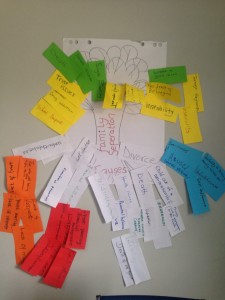Child Protection Trainings help staff and communities better care for children
Caning an entire school class when they continuously show up late.
A seventeen year-old dating a nineteen year-old. A seventeen year-old dating a forty-five year-old.
Leaving a 4 year-old at home alone for three days. Leaving a 15 year-old at home alone for three days.
Do these scenarios depict abuse? Or are they not abuse?
Prompting rousing debate, lists of various behaviours are discussed in Challenging Heights’ newly established Child Protection Training. It’s a training session attended by all new staff at CH, but also, now given to many parents of reintegrated rescued children and parents of students at Challenging Heights School (CHS).
Organised by Vice President and clinical psychologist, Dr. Kate Danvers, the lessons delve deep into phases of child development, work through Post Traumatic Stress Disorder and how children (and adults) handle trauma, and even give examples of positive non-violent discipline measures versus many traditional ways of correcting children’s behaviours.
The training comes from a Western perspective, though takes Ghanaian culture and expectations into consideration. While some participants are educated and may be from larger cities with more Western influence in terms of children’s rights, many are from Winneba and may have always experienced a type of discipline that may be considered out-of-date or even sometimes abusive from a Western view. These perspectives are respected but gently diffused as more appropriate lessons in how to discipline children are shared.
Topics discussed include learning about emotional systems, physically and mentally, in different situations. Mental health is often overlooked in Ghanaian culture, and it’s important for people to know what mental health and mental wellbeing are, so they can support each other and their children.
Participants determine what child abuse is, in terms of emotional versus physical and sexual abuse and neglect. We discuss child labour and spell it out so that people who may be used to the idea of children helping with a family’s work know what is appropriate and what is not. Many people may not know what child trafficking means, or what Ghana’s laws on the subject entail.
Troubleshooting discipline strategies is also important for our staff and beneficiaries. Families may need more examples of better ways to control their children’s behaviour if they themselves were caned or beaten as a child. We talk about behaviour theory and behaviour management; how and why a child may act a certain way and how we deal with situations as they arise.
Each staff member of Challenging Heights receives the training, because at some point, they will be around our beneficiary children, plus staff is expected to be good stewards of children’s and human rights, at work and outside of work in our communities.
Families of reintegrated children and parents of students at CHS have begun their own training so they can learn best practices for handling their children to prevent future abuse and/or trafficking. It’s an initiative funded by Family For Every Child, to help us keep children with their families, and educate families on how to best care for their children.
